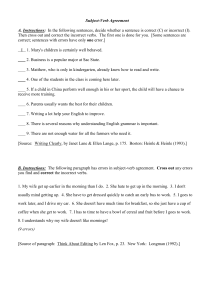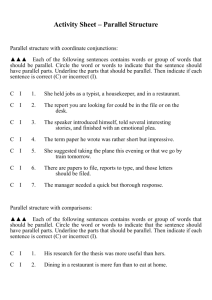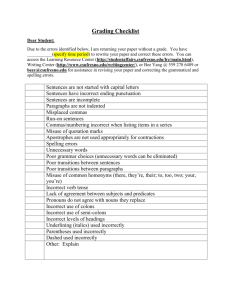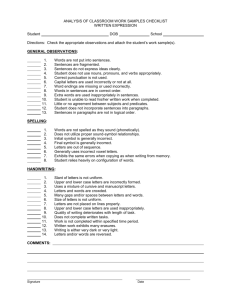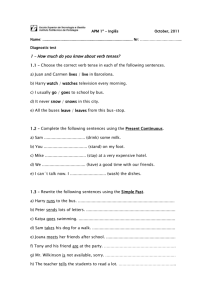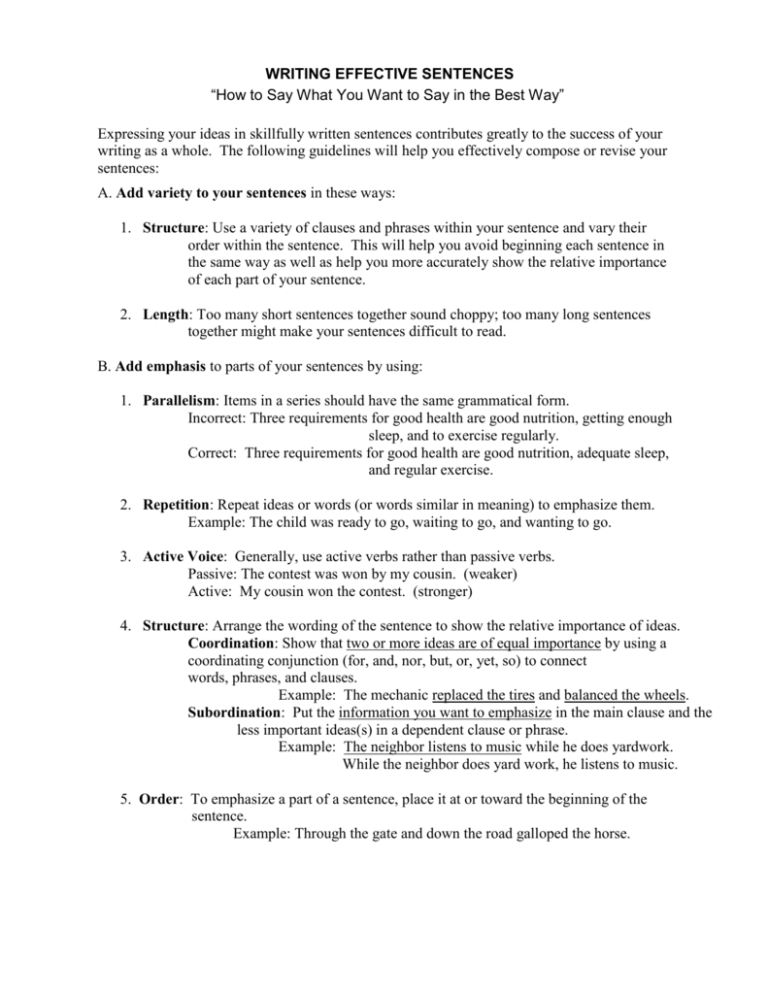
WRITING EFFECTIVE SENTENCES
“How to Say What You Want to Say in the Best Way”
Expressing your ideas in skillfully written sentences contributes greatly to the success of your
writing as a whole. The following guidelines will help you effectively compose or revise your
sentences:
A. Add variety to your sentences in these ways:
1. Structure: Use a variety of clauses and phrases within your sentence and vary their
order within the sentence. This will help you avoid beginning each sentence in
the same way as well as help you more accurately show the relative importance
of each part of your sentence.
2. Length: Too many short sentences together sound choppy; too many long sentences
together might make your sentences difficult to read.
B. Add emphasis to parts of your sentences by using:
1. Parallelism: Items in a series should have the same grammatical form.
Incorrect: Three requirements for good health are good nutrition, getting enough
sleep, and to exercise regularly.
Correct: Three requirements for good health are good nutrition, adequate sleep,
and regular exercise.
2. Repetition: Repeat ideas or words (or words similar in meaning) to emphasize them.
Example: The child was ready to go, waiting to go, and wanting to go.
3. Active Voice: Generally, use active verbs rather than passive verbs.
Passive: The contest was won by my cousin. (weaker)
Active: My cousin won the contest. (stronger)
4. Structure: Arrange the wording of the sentence to show the relative importance of ideas.
Coordination: Show that two or more ideas are of equal importance by using a
coordinating conjunction (for, and, nor, but, or, yet, so) to connect
words, phrases, and clauses.
Example: The mechanic replaced the tires and balanced the wheels.
Subordination: Put the information you want to emphasize in the main clause and the
less important ideas(s) in a dependent clause or phrase.
Example: The neighbor listens to music while he does yardwork.
While the neighbor does yard work, he listens to music.
5. Order: To emphasize a part of a sentence, place it at or toward the beginning of the
sentence.
Example: Through the gate and down the road galloped the horse.
C. Use concise wording to create more powerful sentences. Eliminate all grammatically
unnecessary wording and redundancy of content. Use a phrase instead of a dependent
clause or a word instead of a phrase if you can do so without losing the effectiveness of
the sentence.
Example 1. Omit words:
Wordy: I feel that my employer has not recognized the fact that many of
the employees of this company feel they are ignored.
More concise: My employer has not recognized that many of his
employees feel ignored.
Example 2. Combine words groups:
Wordy: The commuter was frustrated and impatient; he had waited for the
bus for forty minutes, and it was long overdue.
More concise: Frustrated and impatient, the commuter had waited forty
minutes for the long overdue bus.
D. Achieve clarity (clear meaning) by avoiding these problems:
1. Shifts (lack of agreement) in:
Verb Tense (time)—Do not shift back and forth between present and past
without a reason.
Incorrect: In the beginning of the novel the character seems honest,
but his later actions revealed his deceptiveness.
Correct: In the beginning of the novel the character seems honest, but his
later actions reveal his deceptiveness.
Verb Voice—The active form of the verb is generally more effective than the
passive form. (See B.3 for example.)
Point of View—Do not switch between first, second, and third person points of
view. Use third person for most college writing.
Incorrect: One cannot change the past, but you can change your future.
Correct: One cannot change the past, but one can change the future.
Number (singular/plural)—A subject and verb should match in number, and a
pronoun should match its antecedent (the noun it stands for) in number.
Incorrect: The flock of birds are flying south for the winter.
Correct: The flock of birds is flying south for the winter.
Type of Discourse—Use quotation marks only around a person’s exact words.
Direct Discourse: He said, “I have finished my assignment.”
Indirect discourse: He said that he had finished his assignment.
Incorrect: He said, “That he had finished his assignment.”
2. Mixed Constructions (incorrect combinations of grammatical forms):
Incorrect: She was sick was the reason for her absence.
Correct: Her sickness was the reason for her absence.
3. Logic Errors—The grammar is correct, but the idea is expressed illogically:
Incorrect: Poor management and rising costs were the downfall of the company.
Correct: Poor management and rising costs caused the downfall of the company.
E. Achieve specific meaning by using modifiers (words, phrases, and dependent clauses
which act as adjectives or adverbs):
Too general: The salesman relaxed.
More specific: Exhausted by his travels, the salesman relaxed in his quiet hotel room.
Copyright © Tacoma Community College Writing Center. All rights reserved.


